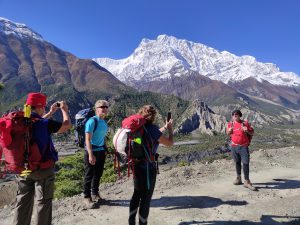
The Teachers Service Commission, an authority responsible for appointing teachers in community schools nationwide, released the results of vacant posts in the science category some months ago. In the Madhesh province, out of hundreds of applicants who contested for 22 vacant posts for science teachers, only six passed their exams. Instances of this nature are not exclusively confined to callouts made for educators but are the proficiency gap is rather pervasive among other science education stakeholders.
Numerous studies have consistently depicted that science is regarded as a daunting subject by students. The predicament remains the same, and you can see the proof in the staggering number of students failing science subjects during national-level examinations or the significant dropout rate in science education at higher levels. Despite efforts to alleviate this issue, the plight persists, leading educators and policymakers alike to grapple with solutions on how to improve students’ scientific literacy.
The consensus of Nepali people towards science is often mistaken and, unfortunately, the temperament towards it is also not encouraged enough in schools and colleges. The gap is leading to the absence of critical thinking and rationalisation- two indispensable components of scientific inquiry.
The core problem
In my recent interactions with high school graduates in the science stream, it became evident that many students remain unfamiliar with the basic tenets of scientific methodology and history. A significant proportion could not identify fundamental scientific principles such as falsifiability, a critical component of scientific inquiry.
Experts suggest that behind this issue is the deep-rooted educational mindset and the way science has been taught in educational institutes so far. Breaking it further, the lack of emphasis on scientific inquiry and critical thinking in science education classrooms, coupled with the acute shortage of skilled science teachers and outdated curricula as well as evaluation methods, is what hinders the general understanding and aptitude.

For many individuals in developing countries, attending educational institutions is the only way to break the cycle of poverty and uplift their societal hierarchy, further hampering their aptitude for science. The system has also failed to provide adequate incentives for teachers and learners to pursue a deep understanding of subjects with a genuine passion for truth-seeking and epistemology. Ultimately, this results in a pernicious cycle of repetition and stagnation in science education.
Social media platforms are also littered with glamorous yet misleading pseudoscientific content, ranging from alternative medicines to ancient science misleading innocent minds. And, unfortunately, national television and podcasts often feature pseudo-scientists who make exaggerated and sweeping claims without undergoing proper peer review research or evaluation dampening the understanding.
So is there a solution?
Upon initial observation, the ramifications of this phenomenon may appear benign in science education. However, its surreptitious effect can incite a paradigm shift towards pseudoscientific beliefs throughout a society. This said foundational gap in science education can be ascribed to several factors, including inadequate pedagogy, limited resources, and insufficient teacher training. Recognising that scientific progress depends on a solid educational foundation is imperative.
Nepal has endured great suffering due to rampant superstitions. And, without mitigating this depravity towards science, scientific progress and literacy may stall in the country, perpetuating the vicious cycle. It is reasonable to argue that this issue can also be attributed to a lack of skilled human resources in STEM fields.
To address this issue, it is vital to develop a robust educational framework that prioritises acquiring accurate scientific knowledge and encourages critical inquiry. The ability to pursue passions and develop a thorough understanding must be developed among the learners.
There is an urgent need for a shift in educational practices to foster scientific curiosity and promote evidence-based reasoning. The science education system should focus on cultivating scientific inquiry, encouraging students to question, analyse and test their hypotheses, and developing a critical approach to knowledge. And, to facilitate that, teachers must have the necessary training and resources to inspire their students and guide them towards greater scientific understanding.

Efforts so far
Efforts have been made to address the gap in understating although the effectiveness of these measures is debatable. The government has taken several measures to address the pressing issue of scientific inadequacy. Notably, the allocation of at least 1 per cent of the national budget to research and development is a positive sign. This slight improvement is adding a layer of trust factor in the general population.
In a recent programme, Prime Minister Pushpa Kamal Dahal expressed his commitment to developing the sector of science and technology in the nation. However, if we want to see real change, we need more than just commitment to address the persistent scientific shortfall and more ambitious yet practical measures are taken in time.
Scientific illiteracy in Nepal is not only holding back science education and scientific progress but also preventing the country from realising its full potential. The Nepal government, educational institutions, and society as a whole must recognise the importance of scientific inquiry and take steps to encourage its development.
From our side too, we must strive to develop a comprehensive science educational system fostering scientific curiosity and questioning. Only then can Nepal hope to achieve its scientific goals and contribute to the global scientific community.
























